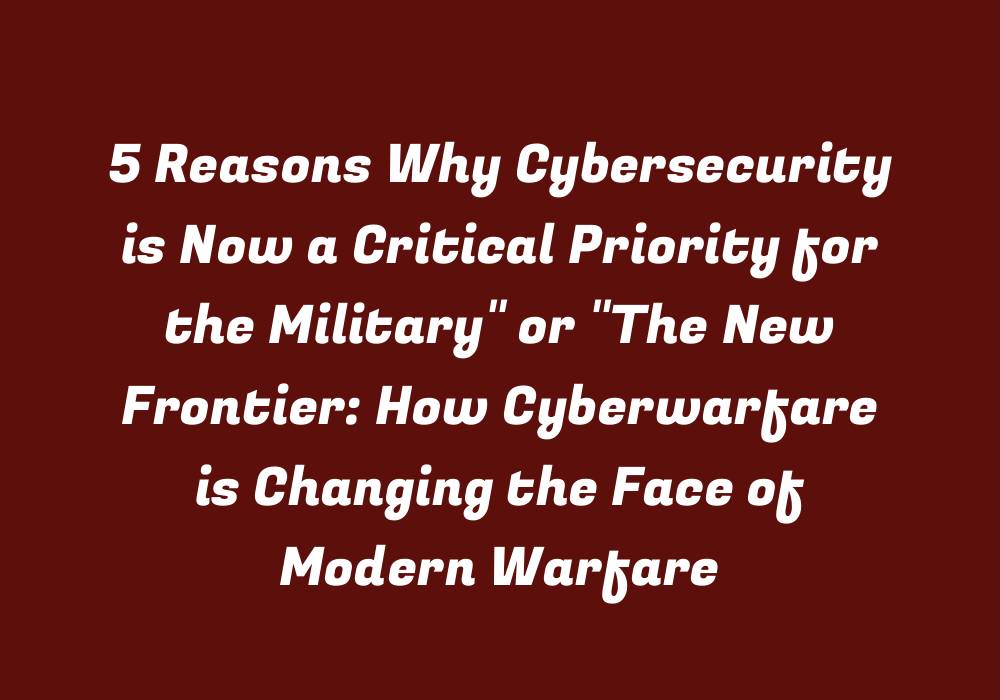Introduction
In today’s rapidly evolving digital landscape, cybersecurity is no longer a matter of choice but a necessity. The military sector is not immune to this reality and must prioritize it for operational effectiveness and national security. This article outlines five reasons why cybersecurity has become a critical priority for the military: 1) Growing threat landscape; 2) Importance of secure communication; 3) Defense against cyber espionage; 4) Protection from targeted attacks; and 5) Resilience in crisis situations.
Growing Threat Landscape
Cyber threats are becoming increasingly sophisticated, persistent, and dangerous for the military. Attackers have various motivations, ranging from financial gains to political espionage or even sabotage of critical infrastructure. In this environment, the traditional focus on physical security alone is no longer sufficient. Cybercriminals can target vital military resources such as command and control systems, data storage, and communication networks, thereby compromising mission effectiveness and putting lives at risk.
Importance of Secure Communication
The military relies heavily on secure communication channels to coordinate complex operations across multiple units. Real-time transmission of critical information is crucial for decision-making and ensuring the success of a particular mission. However, inadequate cybersecurity measures can compromise these communication networks, leaving them vulnerable to eavesdropping or manipulation by adversaries.
By prioritizing robust cybersecurity measures, the military can ensure that sensitive operational details remain secure, thus maintaining an element of surprise and reducing the risk of interception and exploitation by enemies. This will enhance situational awareness and enable more effective decision-making in combat situations.
Defense Against Cyber Espionage
Cyberespionage has become a significant concern for modern militaries as it allows adversaries to obtain valuable intelligence without engaging in conventional warfare. By targeting sensitive information, espionage can compromise military plans, strategies, and even national secrets. This poses a major risk to national security and undermines the ability of the military to maintain a strategic advantage over potential threats.
To counter this threat, the military must invest in advanced cybersecurity solutions that can detect and prevent infiltration attempts. Additionally, strengthening partnerships with private sector organizations specializing in cybersecurity will help develop a comprehensive approach to protect against these evolving threats.
Protection from Targeted Attacks
Advanced adversaries may launch targeted attacks with the intent of crippling specific military assets or disrupting ongoing operations. Such attacks could potentially have severe consequences, including loss of life and damage to vital infrastructure. With cybersecurity as a top priority, the military can implement robust defense mechanisms that are capable of identifying and mitigating these types of threats.
By proactively addressing potential vulnerabilities within their systems and implementing appropriate controls, military organizations can create a more resilient digital environment that is less susceptible to targeted attacks. This approach will help to reduce the risk of significant disruptions or catastrophic events resulting from cyber aggression.
Resilience in Crisis Situations
In times of crisis or conflict, military forces must be able to maintain critical functionality while facing various challenges that may include limited communication capabilities and limited personnel resources. In such situations, cybersecurity measures become even more crucial for ensuring the continuity of operations and maintaining a level of resiliency within the organization.
By prioritizing cybersecurity as a key component of operational planning, the military can enhance its ability to adapt to rapidly changing circumstances during crises or emergencies. This will ultimately help in safeguarding national interests and fostering resilience in times of adversity.
Conclusion
Cybersecurity is no longer an option for modern militaries but a critical necessity that must be prioritized at all levels. By addressing the evolving threat landscape, ensuring secure communication channels, defending against cyber espionage, protecting from targeted attacks, and fostering resilience during crisis situations, military organizations can strengthen their overall capabilities and maintain a strategic advantage in today’s digitally connected world.
